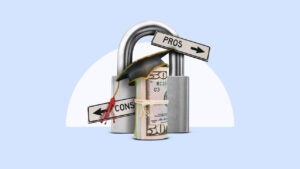SBA 7(a) vs. 504 loans




Key takeaways
- 7(a) loans are designed for working capital and frequent business expenses.
- 504 loans cover equipment or real estate financing.
- Loans available up to $5.5 million with 10- to 20-year terms.
- Down payments required for both loans.
The 7(a) and 504 loans are the two primary loan programs offered by the Small Business Administration (SBA). Combined, these two programs provided nearly $38 billion in loans to small businesses in 2024.
For small business owners, the two loan programs provide access to valuable funding at competitive rates with extended repayment terms. But these programs are designed for different purposes. The 7(a) loan program is primarily used for everyday working capital, while 504 loans are meant for equipment financing and commercial real estate purchases.
Knowing the differences between the two options, as well as the eligibility requirements for each, can help to determine which is best for your business and its needs.
What is an SBA 7(a) loan?
SBA 7(a) loans are the most common option for business owners because they provide flexible funding for various business needs. Generally, you can use a 7(a) loan for working capital, equipment or other expenses. The application process is similar to standard bank loans, although it may take longer to process if you don’t apply through the Express program.
Because the SBA guarantees them, 7(a) loans have competitive interest rates — both fixed and variable. However, their low rates mean that you must meet strict eligibility criteria. In many cases, you may also need to provide collateral to secure your loan.
Your business will need to make a down payment of up to 10 percent or more of the total loan amount. Depending on the size of your loan, you may pay a guarantee fee or other fees set by your lender.
Despite the fees, down payment and strict requirements, 7(a) loans are one of the most sought-after ways of financing a business.

Pros
- Competitive rates. SBA 7(a) loans tend to have lower rates than other business loans on the market, especially if you look at online lenders rather than national banks.
- Finance equipment as well. Your business can finance equipment with a 7(a) loan just like it can with a 504 loan.
- Flexible working capital. 7(a) loans are designed to cover your business’s needs as it grows. This makes them ideal for financing inventory, more workers or any other legitimate expense.

Cons
- Collateral may be required. Your business may also be responsible for providing collateral to back your loan.
- May require a large down payment. Your business could be on the hook for a down payment of up to 10 percent or more of the total amount your business borrows.
- Multiple fees. Depending on the size of your loan, you may have to cover a guarantee fee and a down payment in addition to any fees your lender or loan broker charges.
What is an SBA 504 loan?
SBA 504 loans are designed to cover equipment costs and commercial real estate. Much like 7(a) loans, the application process can take months to complete. There is also a required down payment of at least 10 percent or more 20 percent to 30 percent of the loan amount — but for the 2025 fiscal year, there is no guarantee fee.
The eligibility criteria is also similar between SBA 504 versus 7(a) loans. However, it may be easier to qualify for the 504 loan depending on the size of your business and the type of equipment you are financing. And 504 loans tend to be significantly larger. As of August 2025, the average loan size was over $1.14 million for the SBA 504 loan versus the 7(a) average of $456,417.
In addition, 504 loans are offered through Certified Development Companies (CDCs). A CDC will partner with the SBA to fund a 504 loan of up to $5.5 million per project.

Pros
- Large loan amount. Your business may be eligible for loans up to $5.5 million per project.
- Long terms. 504 loans can have terms of up to 25 years, depending on the amount you finance and how you plan on using your loan funds.
- No guarantee fee. The SBA does not charge a guarantee fee on its 504 loans. However, other fees may still apply.

Cons
- Limited uses. Unlike a 7(a) loan, a 504 loan can only be used to finance equipment or commercial real estate.
- Longer application process. There is more involved in qualifying for a 504 loan, and your business will need to complete a longer application process than with the 7(a) loan program.
- Must apply through a CDC. 504 loans are only available through a CDC. 7(a) loans, on the other hand, are available through banks and alternative lenders.
What are the main differences between an SBA 7(a) vs504 loan?
| 7(a) loan | 504 loan | |
| Purpose | Working capital,equipment, frequent business expenses | Equipment, commercial real estate |
| Loan amounts | Up to $5 million | $5.5 million |
| Requirements | For-profit business based in the U.SReasonable owner-invested equityExhausted other financing options and personal assetsConsidered a small business based on SBA size standardsCollateral required for loans above $50,000 | For-profit business based in the U.S.Net worth less than $20 millionTwo years with an average net income of less than $6.5 million after federal income taxesReasonable owner-invested equityExhausted other financing options and personal assetsConsidered a small business based on SBA size standards |
| Payment terms | Up to 25 years | Up to 25 years |
| Cost | Guarantee fee of up to 3.75% of the guaranteed portion of loan | No guarantee fee for the 2025 fiscal year; CDC processing fees |
| Interest rates | $50,000 or less: Base rate plus no more than 6.5%$50,001 – $250,000: Base rate plus no more than 6.0%$250,001 – $350,000: Base rate plus no more than 4.5%$350,001 and greater: Base rate plus no more than 3.0% | Set at an increment above the current market rate for 10-year U.S. Treasury issues |
Requirements
The requirements for the 7(a) and 504 loan programs have several similarities. Both require applicants be a U.S.-based, for-profit business with reasonable, owner-invested equity. In addition, both require that applicants have exhausted all other loan options.
However, the 504 loan program’s income requirements differ from the 7(a) loan program. In order to be eligible for a 504 loan, a business must have two years of income not exceeding $6.5 million after taxes. The 504 program also requires that a business have a net worth of less than $20 million.
For the 7a loan, applicants must be creditworthy and demonstrate a reasonable ability to repay the money being borrowed. Lenders will also set their own requirements. You will likely need good to excellent personal credit — a FICO score of 670+. Time in business matters as well. While some 7(a) loans are open to startups, most loans go to businesses at least two years old.
In the case of both loans, you will need to provide documentation. This typically includes profit and loss statements, business tax returns, personal financial information and a business plan.
Payment terms
The repayment timeline for 7(a) funds varies primarily between 10 and 25 years based on the loan purpose. The 504 loan program has repayment terms of 10, 20 and 25 years.
Costs
You’ll pay interest and fees with both loan programs. As of 2025, the guarantee fee for the 7(a) loan program can be as high as 3.75 percent depending on the loan amount. There is no guarantee fee for the 504 program for the 2025 fiscal year.
Both loan programs also require a down payment of up to 10 percent or more.
You’ll also pay interest on the money borrowed through both programs. When borrowing using the 7 (a) program, the interest rate is determined based on the amount of money borrowed. Interest for 504 loans is set in increments above the current market rate for 10-year U.S. Treasury issues.
Situations that are best for 7(a) loans
- Your business has gaps in cash flow
- You need to buy inventory to meet customer demands or grow your business
- You need to finance equipment or commercial real estate
- You are able to afford the guarantee fee for larger loan amounts
Situations that are best for 504 loans
- You are looking to finance or improve a piece of commercial real estate
- You need to finance machinery or other expensive equipment
- You want to work with a CDC and can meet job creation or retention goals
- You prefer a longer loan term of 10 to 25 years
The bottom line
The SBA’s loan programs are competitive because they are a solid, comprehensive way to fund your business. Whether you get an SBA 504 loan or a 7(a) loan will depend on your business’s financing needs. Either way, you will need to meet strict eligibility criteria and submit a lengthy application for a chance to qualify for one of these competitive loans.
Frequently asked questions
Why we ask for feedback Your feedback helps us improve our content and services. It takes less than a minute to complete.
Your responses are anonymous and will only be used for improving our website.
You may also like

Pros and cons of private student loans

Low-income loans: Personal loans for a tight budget

SBA loan collateral vs. guarantee: What you need to know

SBA 7(a) loan: What it is and how to apply
